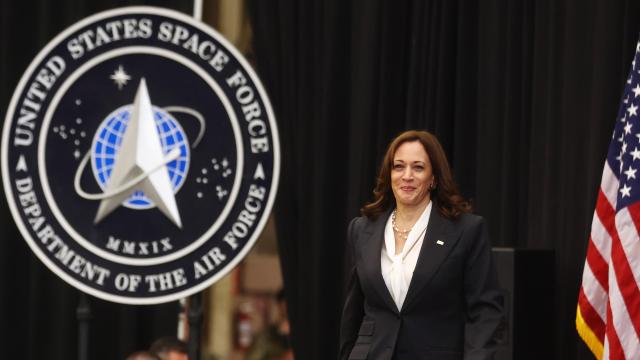While speaking at Vandenberg Space Force Base in California on Monday, Vice President Kamala Harris announced that the United States will no longer conduct anti-satellite missile tests, which are known to produce dangerous quantities of space debris.
These tests, also known as ASAT missile tests, represent “one of the most pressing threats to the security and sustainability of space” according to a White House statement published on April 18.
Last fall, Russia conducted an ASAT missile test that destroyed one of its defunct satellites and required all seven crew members that were then aboard the International Space Station to shelter in place. NASA administrator Bill Nelson later denounced the ASAT test. The Russian show of force produced a cloud of space debris that, some two months later, nearly turned a Chinese satellite into Swiss cheese. China conducted a similar ASAT test in 2007. To date, the United States, Russia, China, and India are the only countries to have successfully shot down a satellite using an ASAT weapon.
“So far, the 18th [Space Defence Squadron] has identified more than 1,600 pieces of debris from the Russian test,” Harris said during her address. The 18th Space Defence Squadron is a space domain awareness team based in Vandenberg. Harris continued: “There are over 2,800 pieces of debris still in space from China’s test 15 years ago.”
Harris also called on other nations — with or without ASAT missile capabilities — to join the United States, which is leading the anti-ASAT missile test charge. “Whether a nation is spacefaring or not, we believe this will benefit everyone, just as space benefits everyone,” Harris said. In its statement, the White House acknowledged the growing number of parties with space-based assets, whether they be governments or private companies, saying:
Developing a shared understanding of what constitutes safe and responsible space activities contributes to a more stable space environment by reducing the risk of miscommunication and miscalculation. This is especially important as there is an ever-increasing number of states and non-governmental entities that rely on space services and space assets which are vulnerable to debris.
As it stands, this agreement is completely self-imposed and is not bound by any specific treaty. Accordingly, the Biden administration, or any future administration for that matter, could suddenly and unilaterally decide to ditch the restriction. That said, the Pentagon expressed the need for some form of international agreement last December.
Array
“It’s so important to reduce the risks of inadvertent escalation and misunderstanding, which can expand beyond the space domain,” said deputy secretary Kathleen Hicks of the U.S. Department of Defence at a National Space Council Meeting in December 2021. “We would like to see all nations agree to refrain from anti-satellite weapons testing that creates debris.”
This recent announcement from Vice President Harris also comes during the continuing Russian-Ukrainian conflict. The Biden administration’s proclamation to not use ASAT weapons may be a sign that the United States is worried about threats to its assets in space, particularly from foreign powers like Russia.
Editor’s Note: Release dates within this article are based in the U.S., but will be updated with local Australian dates as soon as we know more.
